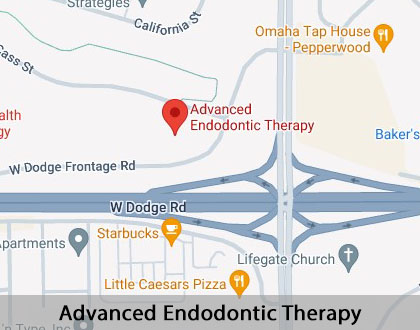Apicoectomy Omaha, NE
Apicoectomies, otherwise known as root-end resection or root-end surgeries, are dental procedures typically performed by a specialized type of dental professional known as an endodontist. An endodontist may perform an apicoectomy to help preserve a natural tooth. You may have just been told that you need an apicoectomy, or you may have just come across the term and become curious about what it means.
Read on to learn more about apicoectomies. For more information about specialized dental treatment in your area, our team at Advanced Endodontic Therapy in Omaha is here to help. Call us at (402) 506-7111 to learn more.
What is an Apicoectomy?
An apicoectomy is a minimally invasive surgical procedure to remove the root tip and surrounding tissue. Having a visual image of the anatomy of a tooth helps one understand what happens during an apicoectomy. At the top of the tooth is the chewing surface, the part that makes contact with food. Beneath that enamel surface lies the soft, inner layer known as the dental pulp. Further down are the tooth roots, which come to a narrow point and help anchor the tooth in place.
Sometimes, a tooth root can become compromised. This may be due to an extensive or residual infection, which remains even after a root canal. Whether due to a failed root canal or other cause, an endodontist surgically removes the problematic part of the tooth root and the associated structures during an apicoectomy.
The patient will receive a local anesthetic so that they will be comfortable during the procedure. According to the American Association of Endodontists (AAE), the procedure is done by making a small opening in the gum line to visualize the tooth root and surrounding tissue. Then, an endodontist removes any tissue that appears inflamed, including the end of the tooth root. This prevents serious complications and allows the tooth root to be saved.
“Whether due to a failed root canal or other cause, an endodontist surgically removes the problematic part of the tooth root and the associated structures during an apicoectomy.”
Reasons for an Apicoectomy and Alternatives
A primary reason an endodontist recommends an apicoectomy is to try and remedy a failed root canal. Sometimes it is difficult to remove all of the infectious particles from the inside of the tooth. When this happens, an infection can linger in the dental pulp and spread to the tooth root.
Other reasons why an apicoectomy is recommended include:
- A person is not able to tolerate a minor surgical procedure
- An abscess at the root
- Fracture of the tooth root
- Small calcium deposits in the tooth root can make it difficult to fully clean in a nonsurgical root canal
Alternative procedures, such as total tooth extraction, may be recommended when the damage to the tooth root is too significant to repair with a root-end resection or the jaw bone is infected. After extracting a tooth, a person will likely be given an option for an artificial tooth replacement, such as a dental implant. An endodontist will always take one's personal dental and medical history into account when deciding how to treat a dental concern.
“If a tooth is extracted, a person will likely be given an option for an artificial tooth replacement, such as a dental implant.”
Who is a Candidate for an Apicoectomy?
To be a candidate for an apicoectomy, the patient must meet certain criteria. This ensures that each surgery has the highest likelihood of success. Most people who are candidates for an apicoectomy have experienced failed root canals.
To be a root-end resection candidate, a person will need to have a healthy immune system. That way, their body will be able to heal and repair fully. In addition, a person will need to have a salvageable tooth, meaning that once the root end is removed, the tooth has a good chance of being saved. To ensure this, an endodontist will also want to make sure the jawbone is not affected by the infection.
“To be a root-end resection candidate, a person will need to have a healthy immune system.”
Check out what others are saying about our dental services on Yelp: Apicoectomy in Omaha, NE
Preparation for the Procedure
Before an apicoectomy, it is important to discuss one's complete dental history and medical history with the endodontist. An endodontist will especially want to know about daily medications and allergies to medication. The night before an apicoectomy, and the day of the procedure, the patient should make sure to follow all pre-op instructions. Luckily, there is usually not much preparation beforehand since apicoectomies are straightforward minor surgical procedures. The most important thing that a patient can do is relax.
“An endodontist will especially want to know about daily medications and allergies to medication.”
Questions Answered on This Page
Q. What kind of procedure is an apicoectomy?
Q. Why would a person need an apicoectomy?
Q. What makes a person eligible for an apicoectomy?
Q. How can one prepare for an apicoectomy?
Q. What happens after an apicoectomy?
People Also Ask
Q. What should patients do after a root canal?
Q. What circumstances require a root canal retreatment?
Q. When should I seek dental care for sensitive teeth?
Q. How is an endodontist different from a dentist?
Apicoectomy Aftercare
After an apicoectomy, it is possible to feel slight soreness and discomfort. A person may also notice swelling. These symptoms are normal following a minor surgical procedure in the mouth.
The endodontist will provide aftercare instructions to follow post-apicoectomy. These instructions may include what to eat while healing, managing discomfort, and activities to avoid. It is very important to follow these directions and to call the office with any problems.
“These instructions may include what to eat while healing, managing discomfort, and activities to avoid.”
Frequently Asked Questions
Q. Can children get apicoectomies?
A. Yes. Children and adults are both eligible for apicoectomies. This procedure can be a beneficial way to preserve a natural tooth while decreasing the risk of consequences from a serious infection.
Q. How common is an apicoectomy?
A. Apicoectomies are very common. In fact, according to the American Association of Endodontists (AAE), they are the most common surgical procedure performed by endodontists. Therefore, endodontists are very skilled in this procedure.
Q. What other types of treatments are available for a failed root canal?
A. Often, an endodontist will consider a repeat root canal revision or root canal retreatment. However, this may require the removal of the protective crown placed after the original root canal. An apicoectomy can leave the protective crown in place and allow an endodontist to specifically address the tooth roots.
Q. How does the jaw bone become damaged after a root canal?
A. After a root canal, if not all the bacterial cells were removed from the inside of the tooth, an abscess (pus collection) can form at the tip of the root. According to the American Dental Association, this abscess can make contact with the jaw bone, where the root is anchored, and cause damage.
Q. Are apicoectomies painful?
A. Apicoectomies may be a bit more uncomfortable than a root canal, but not by much. There may be a slightly longer healing time involved. However, most patients handle the surgery easily and are able to manage any discomfort with over-the-counter pain relievers.
Start Feeling Better – Visit Us Today
By visiting us as soon as possible, our team can help get you the professional treatment you need. Instead of waiting around and allowing the symptoms to get worse, we can provide you with treatment options.
Definitions
Call Us Today
If you are considering treatment for a failed root canal, we can help. Call our team today at 402-506-7111. We can help determine if an apicoectomy is a safe and effective option for you.
Helpful Related Links
- American Association of Endodontists (AAE). Endodontic Surgery Explained. 2024
- Cleveland Clinic. Root Canal. 2024
- Colgate®. What Is an Apicoectomy? 2024
- Healthline. Apicoectomy: What to Know Before and After. 2024
- National Institute of Health (NIH). Reasons for Tooth Extractions. 2024
- Medical News Today. Tooth Infection. 2024
- Oral Health Foundation. Tooth Infections and Heart Disease. 2024
- WebMD. What to Know About an Apicoectomy. 2024
About our business and website security
- Advanced Endodontic Therapy was established in 2008.
- We accept the following payment methods: Cash, Discover, MasterCard, and Visa
- We serve patients from the following counties: Douglas County, Dodge County, Lancaster County, and Sarpy County
- We serve patients from the following cities: Omaha, Benson, Florence, Bellevue, Fort Calhoun, Papillion, Lincoln, Bennington, Plattsmouth, Fremont and Elkhorn, Missouri Valley, and Council Bluffs
- Norton Safe Web. View Details
- Trend Micro Site Safety Center. View Details
Back to top of Apicoectomy










